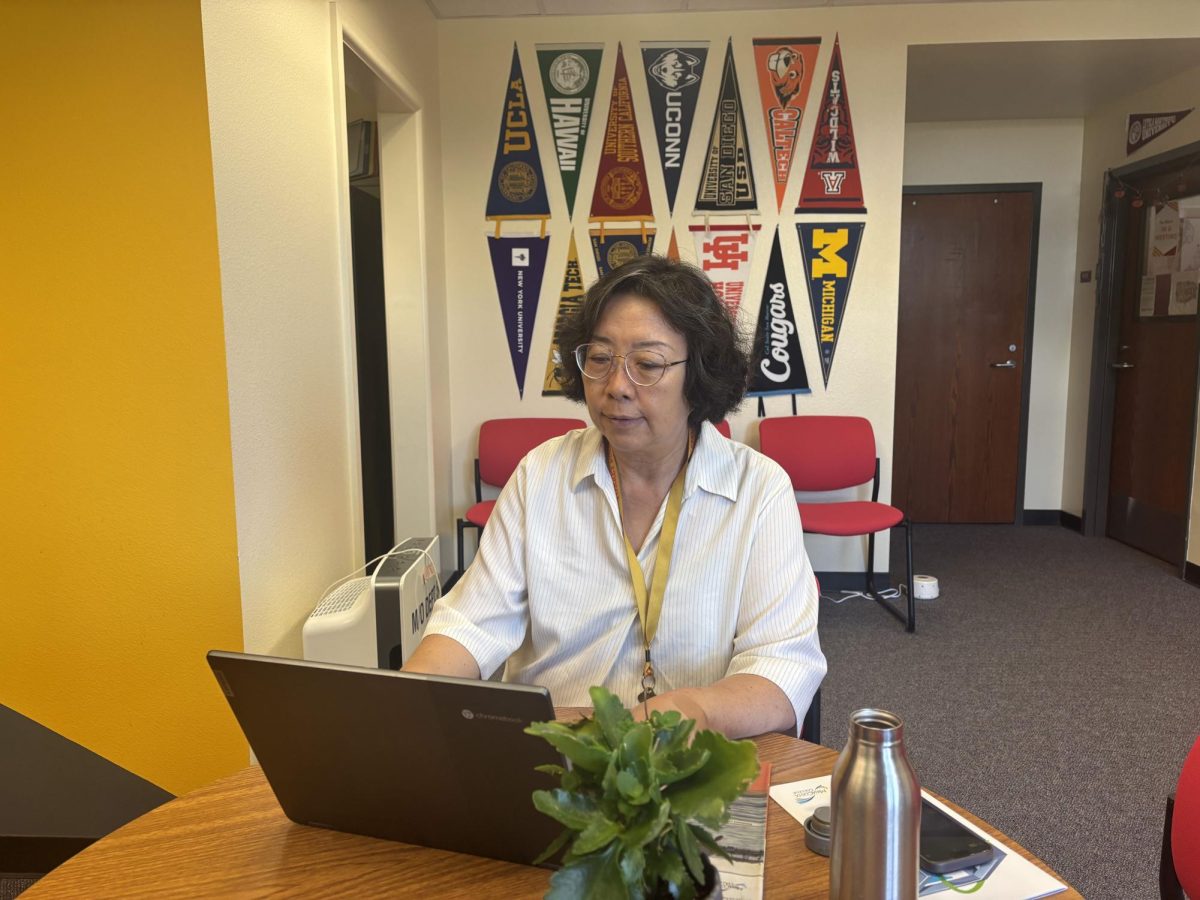Michael Allman was re-elected to the SDUHSD board last month following his previous term from 2020-2024, after competitor Kevin Sabellico conceded from the race on Nov. 21. As a school board trustee, Allman is responsible to ensure that school districts work to serve their communities. He intends to put students and teachers first, as well as bring positive change to the school board. The Falconer interviewed Allman to find out how exactly he intends to serve schools across the district, as well as what the next four years with him as a trustee will look like.
What does your re-election to the school board mean to you?
Being re-elected to the school board for the next four years means that as one of five members of our board, I will continue to advocate for the best possible education for our students. This is a role I take seriously, and it occupies a substantial amount of my personal time. I am hopeful that our district will make progress on my top three initiatives: putting the interests of parents and students first in everything we do, improving the academic achievement of our students and ensuring transparency with the public.
While viewing your campaign website, I saw a statement that describes how you were interested in promoting STEM Education in schools. How do you plan to promote STEM education in schools?
Many of our students would benefit from improved STEM education. The march of technology continues at an ever-increasing pace, and the demand will be great for workers who are technically sophisticated. Whether in Artificial Intelligence, medical and biotechnology, software development, engineering, and many, many other fields, understanding and learning technology will be an important driver in the career success of many of our students. Promoting and meaningfully improving STEM education requires change, which can be difficult and uncomfortable. I hope our board will encourage and empower our Superintendent to identify and implement promising changes that will make an important difference for our students. As one example, consider how we teach and learn math, a key skill in many STEM fields. Many math classes move students along at roughly the same pace, which necessarily means that some students are struggling to keep up while others can learn faster. Yet learning math can be accomplished at an appropriate pace for each student. By carefully considering how to integrate new technologies and teaching methods, we can turn a classroom of 30 students into a collection of 30 individual learning plans, with each student continually challenged at the rate that is appropriate for them.
I also learned from your website that you are a pioneer in the utility-scale solar industry. What are your policies regarding energy sourcing?
In our country, people can make personal choices when it comes to purchasing energy. Many will not think about it much and simply sign up to buy energy for their homes from their local utility. Others may decide that they would like to install solar panels on their roofs so that they can reduce carbon dioxide emissions. Still others may choose to install both solar panels and batteries so that they can go “off grid,” even if it is significantly more expensive to do so. Similarly, some people enjoy owning and driving a gasoline powered car, while others find the added cost of electric vehicles right for them due to environmental, performance or other reasons. However, in our school district, when we approve spending money, we are spending other people’s money (taxpayers), not our own. As such, we owe it to our community to spend that money as wisely as possible. When it comes to energy procurement, we should select the most cost-effective ways to meet our energy needs while, of course, remaining compliant with all state and local laws and regulations.
How are you planning to integrate your business knowledge into how you run the school board?
The knowledge and experience I have built over a 40-year business career can be extremely valuable to our school district. For example, business has taught me how to effect change, improve organizational performance, take prudent risks, align incentives, manage finances, manage people and create a culture of excellence, accountability, and continuous improvement. For example, as the CEO of the largest natural gas distribution company in the country, I created and led an initiative to improve customer satisfaction that resulted in dramatically improved performance. Some of this experience is directly relevant as we create initiatives to improve parent and student satisfaction with the education we provide in our school district. A second example is my financial expertise. As a former CFO, I have a strong understanding of financial reporting and financial management, and I know how to streamline processes to improve operating efficiency. By improving efficiency, our district can free up resources that can be reallocated to our core mission of improving student outcomes. I was able to use this experience to suggest refinancing our Proposition AA school bond when interest rates were low, which resulted in $85 million of additional capital becoming available without having to increase property taxes. This allowed for new capital expenditures, including the first swimming pool in our district’s history that is currently under construction at Torrey Pines High School. I am very much looking forward to celebrating the opening of our new aquatic center!
What are your policies regarding teacher wages (expand if needed) in the face of higher living prices?
Like any organization, we must ensure that we attract and retain high quality employees, while also living within our financial constraints. By all indications, we are successful in this endeavor. The cost of living in California is high, and we are all aware of this challenge. Our retention of teachers has not decreased, however, in the face of rising costs. There is no doubt that one of the reasons for our success in attracting such a high caliber of educators is that we pay well. Our teachers are paid more than any other teachers in our peer group of other local school districts. When the subject of our teachers comes up, without exception our teachers are described in superlative terms – they are dedicated, among the best in the region and work very hard for the benefit of our students. We also have highly educated and involved parents of students who are equally dedicated and driven. With such high expectations of excellence in the classroom, our community is proud that our school district is rated among the highest in the state of California. Excellence in the classroom is a partnership among all the stakeholders.
What is your slogan this year following your re-election? How do you intend to embody it?
My overarching philosophy has remained unchanged throughout my time on the school board:
“I will always put the interests of parents and students first.” We must never forget that the fundamental reason our school district exists is to provide the best education we can, given the level of resources that our citizens, through our government, provide to our school district. In every decision we make we should ask ourselves what is best for our parents and students. When I first ran for the school board in 2020, my top three goals in support of providing the best education we can for our students were what are called the “ABCs” of education: Academic Excellence, Budget Accountability and Community Collaboration. These goals still apply today. I have a large list of issues and initiatives we should address as a school board to live up to these goals, and I hope we can make important and meaningful progress on some of those over the next several years.
What issues did you see last term that you plan to further address, regarding education?
There are many issues I would like to see addressed going forward to improve the service we provide our students. For the sake of brevity, I will point out just two.
The first is Special Education. I have spoken with many parents of special needs students who are frustrated with their interactions with the school district, and I am convinced that our Special Education services can be improved. We have a new Senior Director of Special Education, and I am confident that with her experience and the support of Superintendent Staffieri that we will see important changes soon. With nearly 11% of our students working under an Individualized Education Plan, this will be an important focus area for me.
I would also like to see improved transparency to the public. As an entity funded by taxpayers, we should be open and transparent with the public wherever we can. Our district website should also become an “information portal” where members of our community can find important data and information quickly and easily. Two simple examples include providing access to class syllabi and the details of our various community-related school committees, but there are many others. In addition to providing more information and improving community relations, greater transparency will also improve our efficiency because we won’t have to spend as many district resources fulfilling various requests for information from the public when it is readily available on our website.
As a school board member, I understand you are interested in supporting educators. What are you doing to make teacher’s feel valued and accepted on campuses?
I am constantly amazed at how supportive our district is of our teachers. I can honestly say that in my 40-year career as a business executive and having served on over 20 boards, I cannot think of a single employee group that has been held in such high regard by management as our teachers. The evidence I have seems to bear this out, because our teacher turnover is extremely low. I’m told it is almost unheard of for one of our teachers to leave our district to go work for a neighboring district due to pay issues, or poor working conditions. On the contrary, I’m told that our district is the one that teachers want to work for! I have an “open door” policy, where any member of our community can reach out to me if they have any issues with our district. I’ve helped literally hundreds of people over the years, but I recall only three or four teachers reaching out to me with issues, and none of them were about not feeling valued or accepted on campus. I give a lot of the credit to our leadership team for doing such a great job.
On your campaign website, I read you are very proactive in anti-discrimination efforts. How do you intend to promote inclusivity and safety on campuses districtwide for students?
Promoting inclusivity and safety on campuses is achieved in three ways. First, the board makes it clear through its policies and procedures that discrimination and violence are unacceptable behaviors and will not be tolerated. I authored an anti-discrimination resolution that reinforced this policy and expanded its reach. Second, we must ensure that all staff and students understand our district policies regarding inclusivity and safety, and that they are provided training on how to implement our policies to prevent discrimination. The Board approved our Superintendent’s “One San Dieguito” initiative to help us achieve this goal. Finally, when there are incidents, we need to act quickly and take appropriate action to hold people accountable for their actions. One other issue I recognized is that sometimes students or their parents did not feel comfortable reporting issues of discrimination. This was one of the reasons I advocated for a district “ombudsman” who can act as a confidential advocate and advisor that people can turn to when they need help. I understand that this is working very well.
What drove your decision to work in a school district?
I ran for school board for two primary reasons, to give back to the community after retiring from business and to use my experience and skills to improve the performance of our schools.









